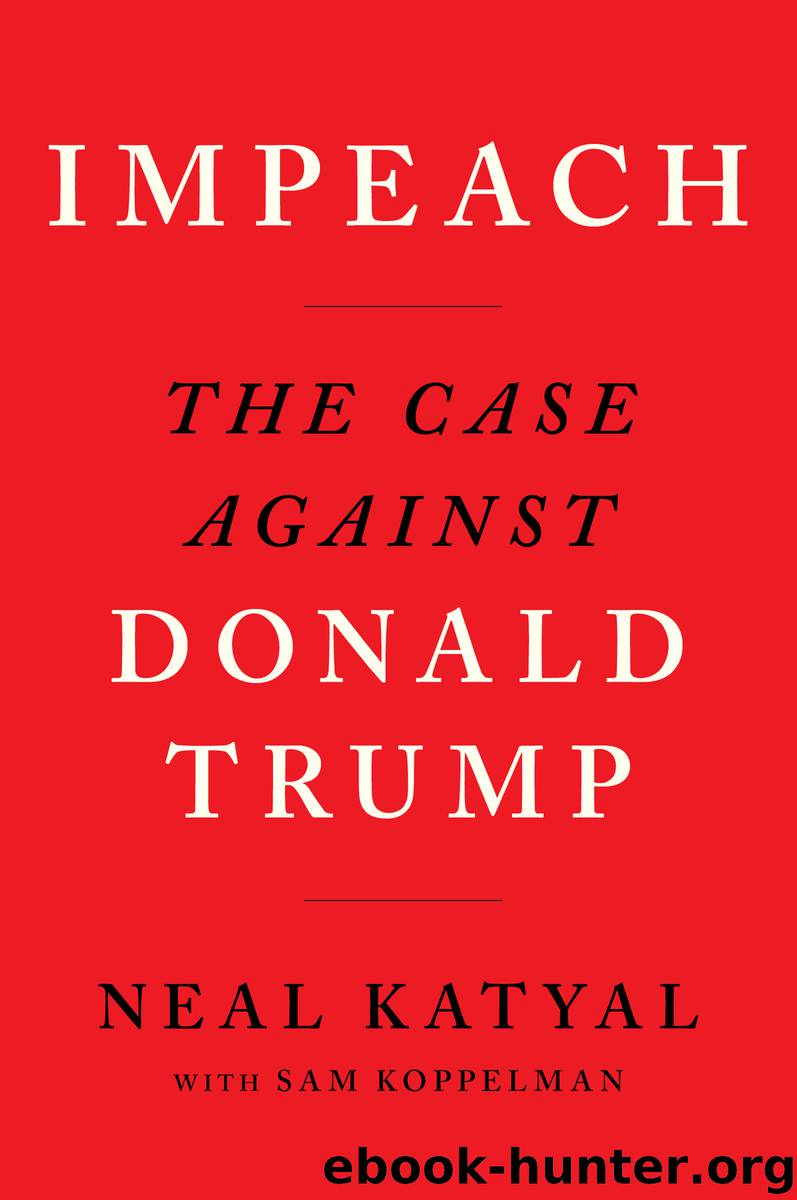Impeach by Neal Katyal

Author:Neal Katyal
Language: eng
Format: epub
Publisher: HMH Books
“You’re Damn Right We’re Obstructing”
Just over two weeks after Speaker Pelosi formally opened an impeachment inquiry, on October 8, US ambassador George Sondland, a key witness to President Trump’s conduct with Ukraine, was set to testify before Congress. Texts sent to him by Ambassador Taylor—including the “it’s crazy to withhold security assistance for help with a political campaign” text—were at the core of the case against President Trump. Sondland’s response—including the “I believe you are incorrect about President Trump’s intentions” text—was at the core of President Trump’s defense. Many believed the phone call between President Trump and Sondland, which took place in the nearly five-hour window between the two texts, held answers to some of the most important questions about President Trump’s arrangement with President Zelensky, and about his efforts to cover it up. Sondland’s testimony, investigators had hoped, would provide some clarity.
But early in the morning of the very day on which Sondland was set to testify, the White House announced that he would be barred from doing so. Shortly thereafter, President Trump tweeted: “I would love to send Ambassador Sondland, a really good man and great American, to testify, but unfortunately he would be testifying before a totally compromised kangaroo court.” That same day President Trump’s White House counsel, Pat Cipollone, sent Congress the letter I mentioned in Chapter 2 (which is reproduced in the appendix), declaring, “President Trump cannot permit his Administration to participate in this partisan inquiry under these circumstances.”
Cipollone’s eight-page letter, as David Graham has argued, can be captured in a five-word phrase: “You’re damn right we’re obstructing.”
As with Trump’s previous claims of executive privilege, Cipollone’s letter rests on a fundamental contradiction. On the one hand, Trump’s lawyers have refused to participate in any criminal investigations because of their belief that the president cannot be indicted in court. The only way you can investigate a president, they argue, is through impeachment. On the other hand, President Trump’s lawyers have begun arguing that impeachment itself is “illegitimate.”
These two beliefs together would leave Congress with no way to compel the president to participate in their inquiry—in effect, rendering him above the law. That, it seems, is exactly the intention of President Trump’s lawyers at the Justice Department. Indeed, they recently went so far as to tell US District Court chief judge Beryl Howell that they believed the Supreme Court ruling compelling Nixon to release his tapes may have been decided differently today.
Judge Howell’s response to the Trump Administration? “Wow. Okay.”
Our Constitution leaves us with two remedies for a president like this. The first is our courts. Whenever a president refuses to comply with a formal subpoena from Congress, the House can challenge his claims of executive privilege before a federal court in Washington, DC. If either party is unsatisfied with this ruling, they can challenge it at the Court of Appeals in Washington—and, if they are still unsatisfied, ultimately at the Supreme Court. That is exactly what happened in Watergate.
Many believe this time will be different, because the majority of justices on today’s Supreme Court were appointed by Republican presidents.
Download
This site does not store any files on its server. We only index and link to content provided by other sites. Please contact the content providers to delete copyright contents if any and email us, we'll remove relevant links or contents immediately.
| Anarchism | Communism & Socialism |
| Conservatism & Liberalism | Democracy |
| Fascism | Libertarianism |
| Nationalism | Radicalism |
| Utopian |
The Secret History by Donna Tartt(16621)
The Social Justice Warrior Handbook by Lisa De Pasquale(11489)
Thirteen Reasons Why by Jay Asher(7788)
This Is How You Lose Her by Junot Diaz(5769)
Weapons of Math Destruction by Cathy O'Neil(5036)
Zero to One by Peter Thiel(4824)
The Myth of the Strong Leader by Archie Brown(4789)
Promise Me, Dad by Joe Biden(4447)
Beartown by Fredrik Backman(4415)
Stone's Rules by Roger Stone(4415)
How Democracies Die by Steven Levitsky & Daniel Ziblatt(4398)
The Fire Next Time by James Baldwin(4342)
100 Deadly Skills by Clint Emerson(4076)
A Higher Loyalty: Truth, Lies, and Leadership by James Comey(4032)
Rise and Kill First by Ronen Bergman(4012)
The David Icke Guide to the Global Conspiracy (and how to end it) by David Icke(3881)
The Farm by Tom Rob Smith(3872)
Secrecy World by Jake Bernstein(3782)
The Doomsday Machine by Daniel Ellsberg(3730)
